Quirks and Quarks7:19That sounds funny — the science behind why certain words make us laugh
Science has determined through rigorous statistical analysis of 45,000 total words what the funniest words in the English language are, and some insights into why they make us giggle.
In fact, the word giggle, along with wriggly, squiffy and boobs are among the funniest words we know according to a new study by Chris Westbury, a psychologist at the University of Alberta. And there’s a big goofy list below of the funniest 200 words in English. Some will make you slaphappy, others will make you upchuck, and one we can’t mention because you may get your knickers in a knot.
Slobbering, puking, blockhead
No, not you. We just wanted to get your attention so we could talk about the purpose of this study.
Westbury, who has an interest in the psychology of humour, wants to understand what it is about certain words that makes us laugh. The capacity to laugh is unique to us and higher primates, but only we have words.
The study is based on three theories of humour. One, called superiority humour, suggests we find humour from making fun of people. «You blockhead Charlie Brown» is an example.
A second theory of humour is incongruity theory, which suggests that less likely things are funnier than likely things. You are not expected to slobber, but when you do, people laugh.
The third theory is juxtaposition theory, and it suggests that people’s actions sometimes make us laugh. Who doesn’t find puking funny?
All three of these theories are reflected in a master list of 200 individual words that make us laugh the most. Don’t worry, we’re getting to them.
Semantic predictors of funny words
One of the conclusions of the study is that there are two ways to predict whether a word will be funny or not: its meaning and its form.
Semantic predictors depend on the meaning of a word and the emotions evoked by that word. This measures how closely a word is — either in meaning or emotion — to the particular category is represents. The study found there were six categories of words that typically make us laugh: sex, bodily functions, insults, swear words, partying and animals.
From the sex category, boob and penis are classics. Bodily functions includes burp and snot; insults are words like ninny and buffoon; swear words are bullocks and jackass (among those we care to list); funny partying related words are booze and shindig; and humour in the animal list comes from pooch and critter.
Did we mention there are more in the list of the 200 funniest words at the end of this article? Keep scrolling …
Information predictors of funny words
Dr. Westbury’s second predictor of funny words he calls «information predictors.» These have do do with the structure of a word or its form.
Words with fewer letters that occur less frequently in English were found to be funnier than words with more common letters. Similarly, less common words are funnier than common ones.
Also a few specific letters or sounds sometimes occur more frequently in funny words. For example the letter ‘k’ appears quite often in funny words: puke, fink, oink; as does the ‘oo’ sound, as in boob and poop. The letters ‘le’ at the end of a word is also often worth a giggle — or a wriggle or even a nibble.
The top 200 funny words (yes, finally!)
(Warning: some of these words could be considered mildly offensive)
slobbering
upchuck
puking
humping
fuzz
bawl
giggle
cooch
bunghole
floozy
boff
cackling
chucky
guffaw
slobber
pukes
giggling
bubby
titty
titties
poop
pooping
wank
mangy
fellate
puss
puke
burp
boobs
pubes
simp
boob
prancing
licker
poops
hussies
booby
jiggling
meany
bucko
hussy
flappy
schmuck
giggly
humph
booger
foxy
fellating
farted
blowjob
waddle
chubby
buxom
goddamn
ninny
buzz
strumpet
fanny
yaps
huffy
cluck
pudgy
barfed
weiner
nymphomaniacs
cootie
wiggling
groupies
wiggly
farting
twerp
yack
poppa
fellated
dumpy
foolery
chortle
pecker
heinie
snogging
wriggly
goofy
whoop
cackle
belcher
crapping
boobies
jiggle
yuks
whoopee
prance
frisky
lummox
gulp
squawk
squawking
weeny
clinger
squiffy
jiggly
snots
muzzy
nincompoop
drool
cooky
wiggle
nilly
blurt
mumbo
lubber
yobbo
farts
squealing
guff
bogart
minx
bozo
groupie
chomp
quip
ponces
giggles
honkey
boner
diddle
willy
f—ker
hijinks
snickering
waggling
ponce
guppy
chortles
momma
biff
conniption
kiddies
wags
twirly
widdle
tipsy
guffaws
puffball
dippy
cuddle
honky
effing
goos
cavort
squirming
dingle
frigging
porky
oink
shagging
tubby
wham
mamma
smarty
cheerios
boozy
catcall
huffs
fornicated
blurts
douches
biddies
tiddly
rotter
crumby
punkin
scamp
hubby
prats
shimmy
scarry
chick
huck
floozie
gabbing
dicks
chump
cavorting
hirsute
titter
hoot
wienie
grump
coxcomb
gabby
jock
bray
snicker
letch
braw
holler
skulk
how’d
yelp
Published December 4, 2019
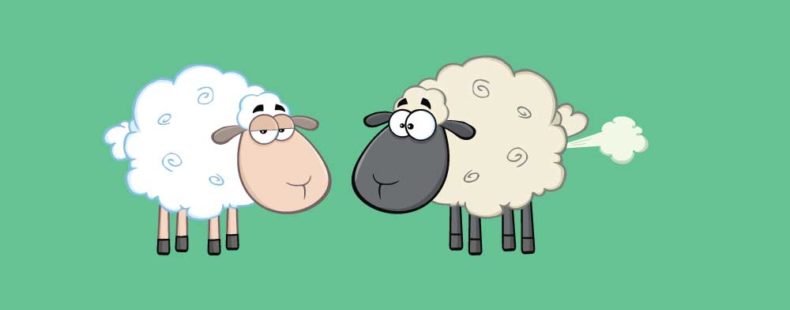
As a hodgepodge of German, French, Latin, Greek, and other languages, English is always full of surprises.
It has funny-sounding words like cattywampus, sure. But, there are also lots words with wacky beginnings. Take fizzle, “to make a hissing or sputtering sound, especially one that dies out weakly.” You know what the word originally meant? “To pass gas,” probably in that manner where you’re trying to stifle it. (Don’t pretend you don’t know what we mean.)
As a bonus (on top of the laughs you’ll get just by reading them), these delightful little origin stories are great for showing off your vocab knowledge at your next family get-together. English isn’t just fun. It’s also funny!
Want more fun word activities and help with your kids’ homework? Sign up for homework help right in your inbox!
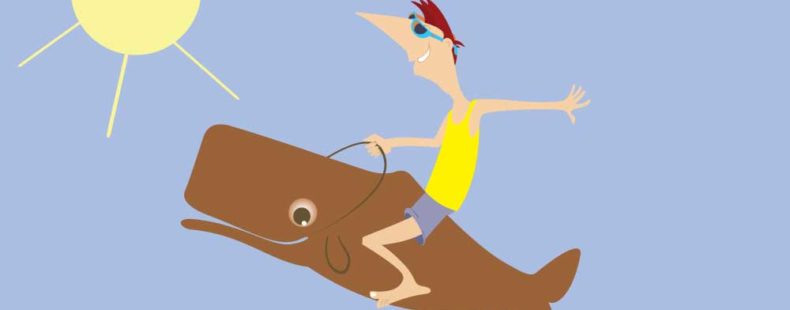
walrus
The walrus is an undeniably funny-looking animal. It’s got a droopy, hangdog kind of face, grumpy-old-man whiskers, and two ludicrous-looking tusks. (No offense to any walruses who may be reading this.)
So, it seems fitting that walrus also has a funny origin story: it may literally mean “whale-horse.” Well, maybe.
The origins of the word walrus are debated. In fact, the writer of the famous Lord of the Rings books, J. R. R. Tolkien, came up with no fewer than six different possible origins of the word.
Anyway, even if it’s not strictly true, the story goes that walrus comes from Dutch. Walvis means “whale” and ros means “horse.” Put it together and a walrus is a “whale-horse.” Which, if you look at this absurd animal, seems like a fitting name for it.
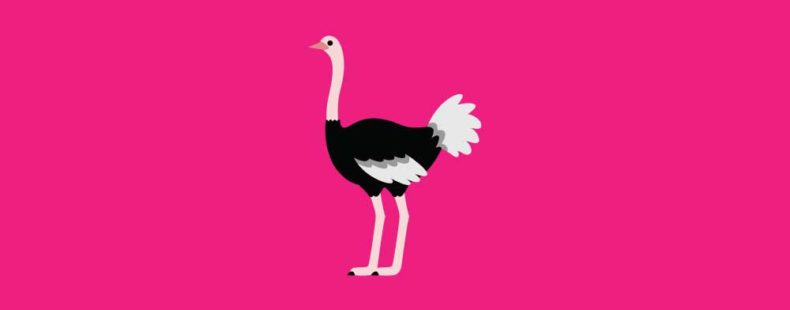
ostrich
Another funny-looking animal with a funny origin story is the ostrich. When you look at an ostrich, with its teeny-tiny head, big, long legs, and large, fluffy body, the first thing that comes to mind is the tiny, adorable sparrow, right? Wait, what?
Well, that’s what the ancient Greeks thought, apparently. The word ostrich ultimately comes from the Greek word strouthion, which comes from their expression for “big sparrow.” That’s right, it seems the Greeks thought the ostrich was just a really big, weird sparrow.
Hilariously, the ancient Greeks also called the ostrich strouthokamelos, which means “camel-sparrow,” because the bird has a long neck like a camel. We almost wish that name had stuck instead.
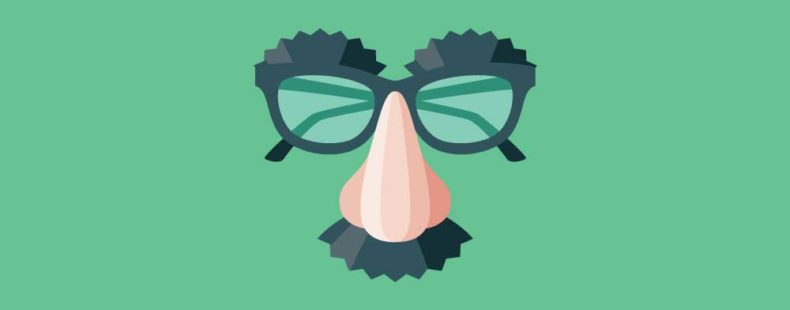
phony
Phony is a word that means “fake” or “made up.” But we aren’t making up this unusual origin story for the word. Although the exact origins of phony are unknown, it’s likely the word comes from an old con known as the fawney rig. Fawney is from an Irish word for “finger ring,” and rig, an old term for a “trick” or “swindle.”
Here’s how it worked: the swindler would “accidentally” drop a piece of cheap jewelry in front of their mark, or target. Then, they would pick it up while expressing relief that they hadn’t lost such a valuable ring, pretending it was worth a lot (as if made of gold). If they were lucky, they’d sell it to the mark for much more than it was worth.
By the 20th century, the spelling of the word was eventually modified from fawney to phony and came to refer to anything fake or counterfeit.
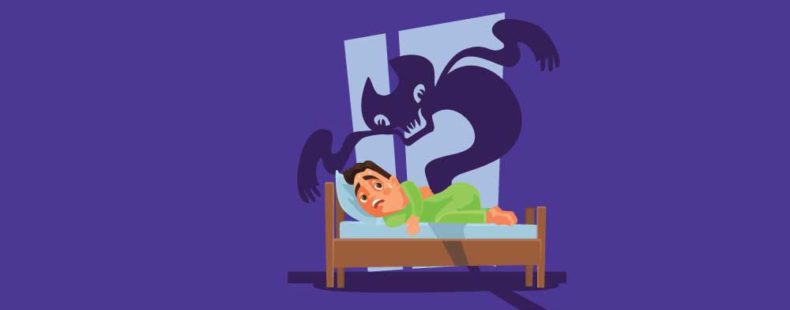
nightmare
WATCH: The Scary History Behind The Word «Nightmare»
Nightmares are scary and unpleasant. But, if it’s any comfort, the fascinating origin of the word nightmare makes clear humans have been having them for centuries.
In Old English, a mare was a kind of evil or cursed spirit. Mares appear in all kinds of folklore, including German and Slavic stories. Mares were said to ride on people’s chests at night, causing suffocation and bad dreams. These mares, often female, were known as nightmares (because they came at night).
By the 1500s, nightmare came to refer to a sensation of suffocation or anxiety during sleep, now a bad dream. While nightmares are frightening, there is a silver lining to this story: at least most of us don’t worry about suffocating in our sleep from evil spirits anymore.
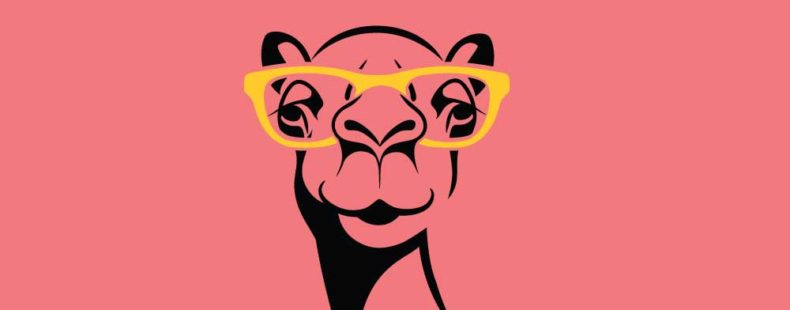
sarcasm
On the hit TV show Friends, the character Chandler Bing can never help himself from making a sarcastic comment. But, maybe he would feel differently about that if he knew the origins of the word sarcasm.
Sarcasm is defined as a “sneering or cutting remark.” That definition is fitting, because the word sarcasm comes from the ancient Greek word sarkazein, which meant “to tear flesh.” That verb became a metaphor for “speaking bitterly.”
So, while sticks and stones can’t break our bones, even the ancient Greeks recognized that sarcasm feels like someone is digging into you.
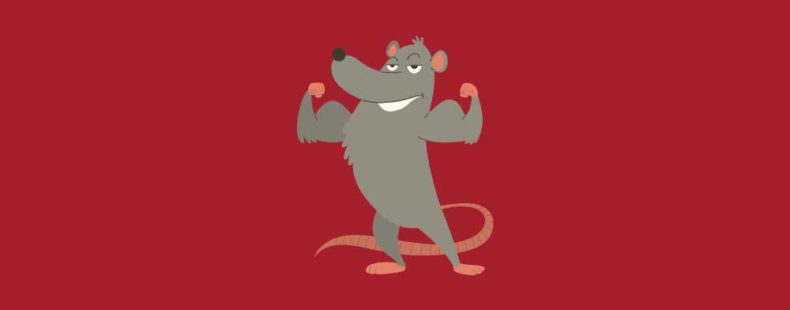
muscle | mussels
OK, take a look at your muscles. Do you think they look like … mice? This might seem like a strange question, but to the ancient Romans, it would have made perfect sense.
That’s because the word muscle comes from musculus, which literally means “little mouse” (mus means and is related to “mouse”).
Apparently, the ancient Romans thought that the movement of a muscle, especially when you flexed your bicep, looked like a mouse was running under your skin. Which, if you kind of squint and exercise your brain muscles, kind of makes sense.
Speaking of mice, the ancient Romans also thought that mussels, the shellfish, looked like little mice. That’s where the name mussels came from (that same Latin noun, musculus).
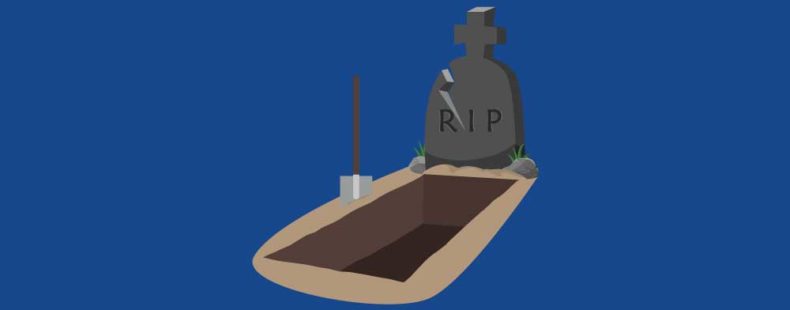
mortgage
A mortgage is a long-term loan that you take out on a house or other property. The word mortgage comes from the Old French expression meaning “dead pledge.” A pledge, in this context, refers to the contract.
If you’re morbid, you might think that the “dead pledge” refers to the fact that you’ll be paying your mortgage off until you die. And while that is a darkly funny reading of this unusual expression, that’s not quite right.
In Old French, the pledge was considered “dead” when either it was paid off by the tenant or when the tenant failed to pay, resulting in the land being taken back.
The takeaway from all of this? Mortgages have stunk for hundreds of years.
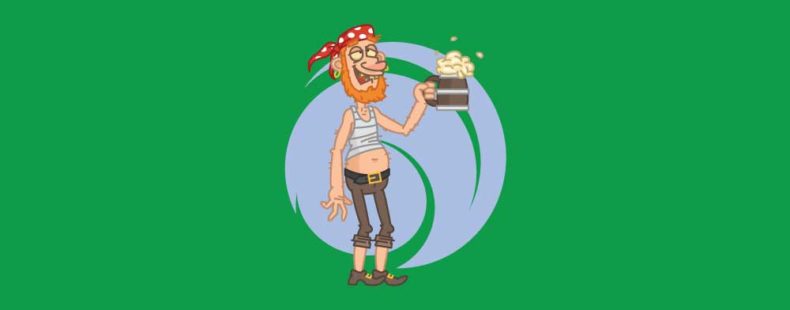
bonkers
Bonkers is a funny-sounding word. It’s a humorous, softer, informal way to say “crazy” or “nuts.”
Its origins aren’t clear, but bonkers is first recorded as British naval slang for “a bit drunk” in the 1940s—perhaps acting as if someone has bonked, or hit, them on the head.
You know that one word people say and you start randomly laughing? I want to know what ya’lls word is! Doesn’t matter how weird share your thoughts!
Uranus. I’m a 65 year old child seriously.
Report
Nincompoopery. Yes it’s a real word.
Report
giggles. it just seems funny and/or dirty to me.🤭
Report
Couscous and moist. Don’t even ask why, I wouldn’t be able to answer lol
Report
suspicious. I think you know why…
Report
Some Welsh place names sound quite funny like Splott, Plwmp (ploomp) and tudweiliog (tud-wheelie-og) 😄
Report
Sauvignon — LOL or any fancy, French wine name, especially when my mom says it with a duckface.
Report
Not sure why, but when I was in third grade I couldn’t stop cracking up at this photo of people dressed as pikachus standing in a line
Report
For some weird reason I think the word proper is hilarious! Lol 😂😂
Report
When my son was 9, his favorite word was dictator. Because it’s a di@k and a tater.
Report
Sodden. Idk it just makes me laugh, especially if someone says it with a straight face.
Report
Gazump
Gazump
Gaz… hehehehe…!
Report
Popular on Bored Panda
Popular on Bored Panda
User Submissions


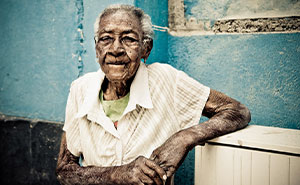
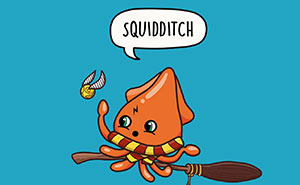

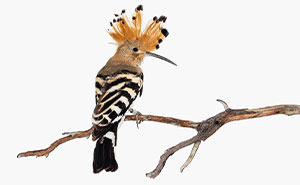
|
|
Security code is wrong! Please try again! |
Add to saved lessons
| Feb 14, 2022Dec 23, 2022
LESSON OVERVIEW
In this lesson students study advanced synonyms for laugh, watch a video about laughter and discuss different aspects of laughter. The video idea comes from one of our subscribers. Phil, thank you! #yousuggestwecreate
C1 / Advanced60 minStandard LessonFree / Premium Plan
WARM-UP & VIDEO
The lesson starts with an activity in which students read five incomplete jokes and decide what words to put in the gaps. Afterwards, students have a short discussion about jokes and how our cultural background influences our sense of humour. Then, students watch the first part of a BBC video about laughter and note down the reasons why people laugh. During the second viewing, students make notes on several topics from the video (e.g. how apes and humans laugh, benefits of laughter). After that, they answer some questions about laughing in different situations (e.g. at inappropriate times, being unable to stop laughing).
SYNONYMS FOR LAUGH & SPEAKING
This part of the lesson starts with an exercise in which students learn seven synonyms for laugh (e.g. cackle, giggle, chuckle). They do it by listening to the types of laughter represented by the verbs (audio available for teachers online) and reading sentences which put the verbs in context. Then, they come up with other contexts for the words by describing short situations with the use of the verbs. After that, students read the definitions of the verbs from the previous exercise and correct the mistakes in them (e.g. Chuckle means to laugh quietly, not loudly.). The vocabulary is then practised in a multiple choice task in which students choose the correct synonym for the verb laugh in a few sentences. The last part of the lesson is an extended speaking exercise (similar to Part 2 of the CAE speaking exam). Students work in pairs or groups of three and compare and contrast sets of photos showing people laughing in different situations. After the conversation about the photos, students discuss some questions related to laughter and wellbeing.




